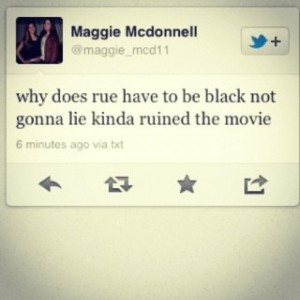Before I start: if you have the time, please check out this video (it’s short and actually really cute) about stereotypes of Africans in the Western media. It’s about changing perspectives and it’s definitely worth a watch.
Do you know what whitewashing is? If so, good for you. If not, I’ll take a moment to explain.
Whitewashing boils down to one thing: you take a character that should be one race, and you replace that character with a white person.
For example, there is a book by Justine Larbalestier that features a black protagonist. When the book first came out, the cover featured a Caucasian female. The publishers quickly fixed this problem, but it still drew a lot of backlash.
The first Dragonball movie to ever come out had white actor as Goku (and I can guarantee you there was a collective sigh from the Asian community when we found this out).
In Avatar: The Last Airbender—the main characters were white. The villains were people of ethnicity. Not white? You can be a bad guy. Not exactly what we’re going for.
Even Katniss from “The Hunger Games” was supposed to be not-white. In the book, she is described as having dark, olive skin and grey eyes. Jennifer Lawrence is an amazing actress, but with her blonde hair, blue eyes, and pale skin, she doesn’t quite fit the bill (though she was a bit tanner in the second film).
I could go on for ages. Even though whitewashing is still prevalent now, it was even worse in the past. A 1937 film version of “The Good Earth” (it takes place in China, with… well… Chinese characters) was portrayed by an all-white cast. By that, I mean that every single actor was white. They used heavy makeup to portray the characters as Asian (called yellowface), but that is essentially the same as blackface (and we’ve all realized that blackface is a no-no). “Breakfast at Tiffany’s” had Mickey Rooney portraying a Japanese man with so many stereotypes it should make your head spin. Oh, was it bad.
So what gives? Why is Hollywood taking PoC (people of color) and replacing them with Caucasian actors and actresses? Well, at its heart is a single argument: People don’t want to read books unless someone white is on the cover. People won’t watch movies unless the main character is white. Someone read between the lines: roles of ethnicity just don’t sell.
Is this true? Well, I guess we’ll never know. There haven’t been enough non-white movies to tell.
Whitewashing is bad, especially when the subject matter the movies draw from was Asian to begin with. If we can’t cast an Asian lead in Dragonball or Akira or The Last Airbender, what hope is there for Asian leads in mainstream Hollywood films? What hope is there for a fully developed character being the lead in the film… who just happens to be black, or Spanish, or Latino, or Indian? What is the hope of actual representation?
This all ties in with racism. Because there are so few movies or shows with Asian or PoC leads, when (by some miracle) we actually do get these shows and movies, there tends to be massive criticism. For example, even though Rue in The Hunger Games was clearly written to be black, a lot of people were surprised and angered by the young actress’s skin color. When the information was released the Michael B. Jordan (a black actor) would be playing the human torch in a Fantastic Four reboot (traditionally played by a white actor), the internet blazed with indignation and backlash. But why? When we whitewash characters, we hear a very small amount of criticism, if any. When we reverse things, we’re upset that we’re not staying true to the story line. Something doesn’t click there.
Have you heard of Wong Fu Productions? They’re a (really funny) group of popular Youtubers who happen to be Asian-American. Their friends often star in their short films (and their friends are often AA as well). Their videos get a lot of ignorant comments. “Why is everyone Asian?” is just as common- and just as inappropriate– as “slanty eyes.” I mean, how often do you watch a movie and ask yourself, “Why is everyone here white?” The content of the movie, show, or book should be more important than the ethnicity of the characters. If it’s funny, meaningful, poignant, well written… why does it matter if it’s not white?
Whitewashing ultimately accomplishes nothing. What it implies is that different ethnicities will not be popular with viewers. It cuts back the chances for potentially talented actors and actresses to have their time on the big screen. It can promote racism. If we really want to progress with our acceptance of other cultures (or, you know, not alienate half of America), giving these actors and actresses a chance to star in films, movies, or on the covers of books is a good step.







